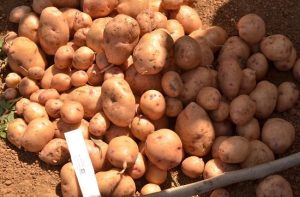New potato varieties modified to withstand the deadly late blight disease said to be responsible for over 90 percent destruction on farmers field in Nigeria will be available to farmers from the 2025 planting season, Dr Charles Amadi, a breeder with the National Root Crop Research Institute (NRCRI), Umudike, has said.

Dr Amadi is the Principal Investigator, Global Biotechnology Potato Partnership (GBPP) project in Nigeria under the USAID-funded Feed the Future Project that is implemented in four countries – Kenya, Bangladesh, Indonesia and Nigeria.
The Partnership is coordinated by Michigan State University and involves various partners including the National Root Crop Research Institute, Umudike; the African Agricultural Technology Foundation (AATF); and International Potato Centre (CIP).
He said: “After two years of research work in confinement and multilocation in potato growing belts of Nigeria, because of the uniform results from all locations, we are confident that threats of late blight would be successfully contained in Nigeria with the release of these late blight resistant varieties that will be available in 2025.
“We just need one more year of regulatory multilocation data to present them to National Biosafety Management Agency for environmental release. If we get the permit for environmental release this year, we will take them to On-farm trials in 2025. If they show consistency of performance across Nigeria, we will submit them to the National Varietal Release Committee for consideration and approval after field inspection by the technical sub-committee. Right now, all is on course, and we are working to meet that deadline.”.
Dr Amadi, who is the Director, Tuber Crop Research at NRCRI, noted that Nigeria ranks seventh among potato-producing countries in Africa and fourth in Sub-Saharan Africa, with an annual production yield of around 843,000 tonnes (830,000 long tons; 929,000 short tons) and an actual planted area of 270,000 hectares (670,000 acres). In spite of that, the average yield in Nigeria of 3.1 tonnes per hectare is among the world’s lowest.
Potato production in Nigeria predominantly occurs in small farms whose farmers still rely on traditional tools such as machetes and hoes as opposed to tractors. According to a 2012 study, an estimated 300,000 households in Nigeria engage in potato production, which translates to an average planted area of 1 hectare (2.5 acres) per household each year. The country’s main potato-planting region is the Plateau State (Barkin Ladi, Jos South, Riyom, Bokkos, and Mangu) which accounts for almost 90% of the national potato yield.
Other potato-producing areas include Obudu in Cross River and Mambilla in Taraba State. Additionally, some low level of production takes place in Kaduna and Kano states during the harmattan months of November to January. Potato production takes place in both the wet season (April till September) and the dry season (October till March).
Potato production in Nigeria faces many constraints, including disease and pest, unavailability of good-quality potato seeds, poor storage methods, insufficient education on farming methods and pest control, inadequate research and development, and inadequate farming equipment.
Meanwhile, researchers at the NRCRI are celebrating the two-year results from both the confined and multilocational trials of the genetically modified potato varieties currently under research in the country.
Dr Amadi said that after collecting and analysing data from the two-year research work, they have found that the biotech potatoes have a yield advantage of 300 percent over the best performing conventional variety when no fungicide is applied.
Dr Amadi said that, over the years, potato farmers in Nigeria were exposed to many threats including those who contemplated suicide because of potato failure due to late blight infestation but that two years of research on addressing the pest and diseases threats, the team was confident that succour has finally come for farmers in the country.
The research is currently being conducted in Nigeria’s potato growing belt of Plateau and Taraba states.
“In our evaluation in the confined and multi-locational trial sites at Kuru near Jos, Bokkos (Plateau State) and Kusuku in Mambilla (Taraba State), we discovered that, without the application of fungicides, the biotech potatoes were able to withstand late blights attacks and performed better and our farmers are happy,” he said.
“During these evaluations, biotech potatoes were grown together with their non-transformed relatives (Near Isogenic lines) and with some check varieties. In all these evaluations, when no fungicide is applied, late blight severely damaged the other potatoes, while the biotech potatoes were completely untouched.
“As a result, they gave yields that were 300% higher than their near Isogenic lines and the check varieties. However, when fungicide was applied, the yield difference disappeared showing that there were no yield losses in biotech potatoes because of the introduction of resistance genes.”
Dr Amadi added: “The biotech potatoes which are GM potatoes offer famers two vital benefits which includes increased yield and less use of fungicides. These translate into higher income for the farmers and better living conditions.”
Nigeria ranks seventh among potato-producing countries in Africa and fourth in Sub-Saharan Africa, with an annual production yield of around 843,000 tonnes (830,000 long tons; 929,000 short tons) and an actual planted area of 270,000 hectares (670,000 acres). In spite of that, the average yield in Nigeria of 3.1 tonnes/ha is among the world’s lowest.
